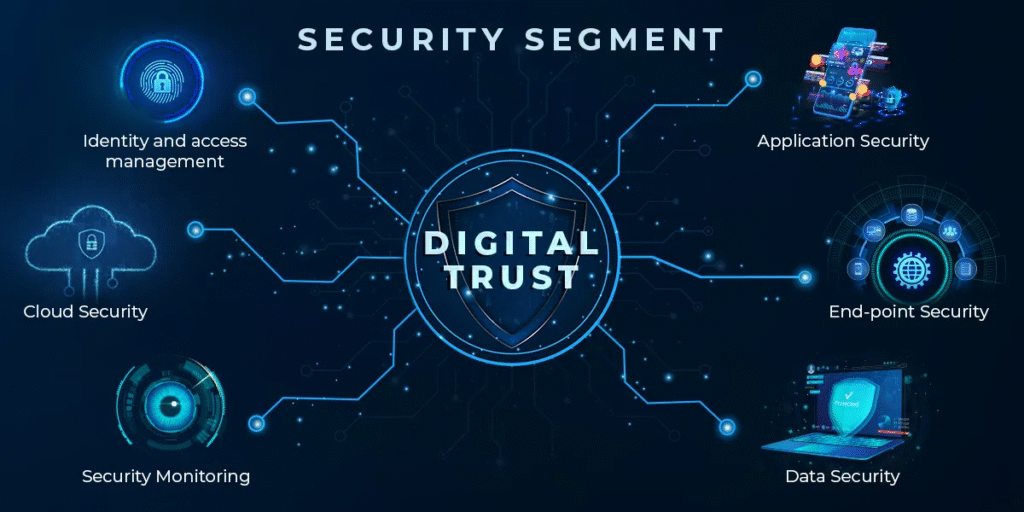
As digital transformation accelerates, organizations face growing cybersecurity threats—from ransomware attacks to sophisticated phishing schemes. At the same time, customers and partners demand digital trust: the confidence that their data is secure, private, and ethically managed.
In this blog post, we’ll explore how businesses can strengthen cybersecurity frameworks while fostering digital trust—ensuring resilience, compliance, and long-term customer loyalty.
Why Cybersecurity & Digital Trust Matter More Than Ever
Table of Contents
Toggle1. Rising Cyber Threats
-
Ransomware attacks increased by 93% in 2023 (Fortinet).
-
AI-powered cyberattacks make threats harder to detect.
-
Supply chain vulnerabilities expose businesses to third-party risks.
2. Customer Expectations
-
85% of consumers won’t engage with a business if they distrust its data practices (Cisco).
-
Regulations like GDPR & CCPA enforce strict data protection rules.
3. Business Impact
-
A single data breach costs an average of $4.45 million (IBM).
-
Companies with strong cybersecurity see higher investor confidence.
Key Strategies to Enhance Cybersecurity & Digital Trust
1. Zero Trust Architecture (ZTA)
-
“Never trust, always verify” approach for all users and devices.
-
Micro-segmentation limits lateral movement in case of a breach.
2. AI & Machine Learning for Threat Detection
-
Predictive analytics identify anomalies before attacks happen.
-
Automated response systems mitigate threats in real time.
3. Multi-Factor Authentication (MFA) & Biometrics
-
Phishing-resistant MFA (e.g., FIDO2 keys) blocks credential theft.
-
Behavioral biometrics detect suspicious login patterns.
4. Blockchain for Secure Transactions
-
Immutable ledgers prevent tampering in financial/logistics data.
-
Smart contracts automate compliance with reduced fraud risk.
5. Privacy by Design
-
Data minimization – Collect only what’s necessary.
-
End-to-end encryption (E2EE) for sensitive communications.
Building Digital Trust: Beyond Cybersecurity
1. Transparent Data Practices
-
Clear privacy policies (no legalese).
-
User consent controls (easy opt-in/opt-out).
2. Ethical AI Governance
-
Bias audits for AI decision-making systems.
-
Explainable AI so users understand automated outcomes.
3. Cyber Resilience Planning
-
Regular penetration testing & incident response drills.
-
Cyber insurance to mitigate financial fallout.
Future Trends
🔹 Quantum-Safe Cryptography – Preparing for post-quantum cyber threats.
🔹 Decentralized Identity (DID) – Users control their own digital IDs via blockchain.
🔹 AI-Powered Fraud Prevention – Real-time deepfake detection.
Conclusion
Cybersecurity is no longer just an IT issue—it’s a business-critical priority tied directly to digital trust. By adopting Zero Trust, AI-driven defenses, and ethical data practices, organizations can protect assets while building lasting customer confidence.
Start with a cybersecurity maturity assessment to identify gaps and prioritize improvements.
F.A.Qs
Frequently asked questions
ERP implementation is the process of integrating an Enterprise Resource Planning (ERP) system into a business. This includes various stages such as readiness assessments, customization, deployment, and post-launch support to ensure the system meets the organization's needs efficiently.
Trax Group provides seamless Microsoft Dynamics 365 implementations tailored for Saudi businesses. Our services include comprehensive readiness assessments, customized deployment strategies, and ongoing support to maximize return on investment and minimize disruption.
Implementing an ERP system can lead to improved efficiency, streamlined operations, better data management, enhanced compliance, and ultimately, a higher return on investment (ROI) by optimizing business processes and resources.
Business transformation refers to the process of fundamentally changing the way a business operates, often through the optimization of operations, digitization of workflows, and alignment with strategic goals, such as Saudi Vision 2030, to drive growth and improve efficiency.
Trax Consulting assists organizations in their business transformation journey by providing expert guidance on optimizing operations, implementing digital workflows, and ensuring alignment with strategic initiatives like Saudi Vision 2030 to unlock new growth opportunities.
Aligning with Saudi Vision 2030 is crucial for business transformation as it ensures that organizations are in sync with national strategies aimed at economic diversification, sustainability, and innovation, ultimately positioning them for long-term growth and success in a rapidly evolving market.
Business consulting is a service that provides organizations with expert advice and strategies to help them overcome challenges, seize opportunities, and improve overall performance. It often involves analyzing current practices and implementing effective solutions tailored to the organization's objectives.
Trax Group’s Business Consulting can empower your organization by providing actionable insights, tailored strategies, and expert guidance to navigate challenges and leverage opportunities. Our senior consultants utilize global expertise combined with local market knowledge to deliver transformative results.
Business consulting can address a variety of challenges including operational inefficiencies, market entry strategies, financial management, organizational restructuring, and more. Our consultants assess your specific situation to provide targeted solutions that drive measurable improvements.
Trax Academy offers a variety of training programs that blend real-world consulting projects, industry-certified training, and personalized coaching to equip professionals with the skills needed to lead change and meet today's business needs.
TRAX Scale supports SMEs by offering affordable, step-by-step technology solutions that allow businesses to automate processes, improve operational efficiency, and accelerate growth while ensuring continuity in their operations.
Trax Academy provides targeted training programs designed to address specific skill gaps within teams, ensuring that organizations can adapt to market demands and stay competitive. Our blend of practical projects and coaching enables effective reskilling.
Other Questions
General questions
TRAX Scale supports SMEs by offering affordable, step-by-step technology solutions that allow businesses to automate processes, improve operational efficiency, and accelerate growth while ensuring continuity in their operations.
TRAX Scale provides a range of technology solutions designed for SMEs, including automation tools, software for process management, and systems that enhance data analytics and operational efficiency.








No comment